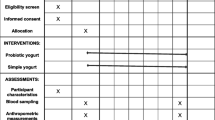Abstract
Objective: To investigate the effect of a probiotic milk product containing the culture CAUSIDO® and of two alternative products on risk factors for cardiovascular disease in overweight and obese subjects.
Design: An 8 week randomized, double-blind, placebo- and compliance-controlled, parallel study.
Subjects: Seventy healthy, weight-stable, overweight and obese (25.0<BMI<37.5 kg/m2) males (n=20) and females (n=50), 18–55 y old, were randomly assigned into five groups.
Intervention: Four groups consumed 450 ml fermented milk products (yoghurt) daily. Group 1: a yoghurt fermented with two strains of Streptococcus thermophilus and two strains of Lactobacillus acidophilus (StLa). Group 2: a placebo yoghurt fermented with delta-acid-lactone (PY). Group 3: a yoghurt fermented with two strains of Streptococcus thermophilus and one strain of Lactobacillus rhamnosus (StLr). Group 4: a yoghurt fermented with one strain of Enterococcus faecium and two strains of Streptococcus thermophilus (CAUSIDO® culture), GAIO® (G). The dietary composition of the yoghurt was otherwise similar. The fifth group was given two placebo pills (PP) daily.
Results: When comparing all five treatment groups, unadjusted for changes in body weight, no statistical effects were observed in week 8 in the G-group on low density lipoproteins (LDL)-cholesterol (P=0.29). After adjustment for small changes in body weight, LDL-cholesterol decreased by 8.4% (0.26±0.10 mmol/l; P<0.05) and fibrinogen increased (0.74±0.32 mmol/l; P<0.05) after 8 weeks in the G-group. This was significantly different from the group consuming chemically fermented yoghurt and the group consuming placebo pills (P<0.05). After 8 weeks, systolic blood pressure was significantly more reduced in the StLa and G-group compared to StLr. No other differences were found.
Conclusion: The CAUSIDO® culture reduced LDL-cholesterol and increased fibrinogen in the overweight subjects at a 450 ml consumption daily for 8 weeks. The effect on LDL-cholesterol confirms previous studies. An immunostimulation by one of the strains in the product might explain the effect on fibrinogen in the G-group.
Sponsorship: MD Foods A/S, Denmark.
European Journal of Clinical Nutrition (2000) 54, 288–297
Similar content being viewed by others
Author information
Authors and Affiliations
Contributions
Guarantor: Arne Astrup.
Contributors: A Raben and A Astrup initiated the project, which also was a part of a bachelor-project of N Haulrik and AS Hansen. M Manders was responsible for the compliance pilot-study and the compliance measurements as part of her student exchange programme (ERASMUS) at the department. All the authors were involved in the carrying out the experimental work. N Haulrik, AS Hansen and L Agerholm-Larsen made the statistical analysis. L Agerholm-Larsen wrote the article in collaboration with A Raben and A Astrup.
Corresponding author
Rights and permissions
About this article
Cite this article
Agerholm-Larsen, L., Raben, A., Haulrik, N. et al. Effect of 8 week intake of probiotic milk products on risk factors for cardiovascular diseases. Eur J Clin Nutr 54, 288–297 (2000). https://doi.org/10.1038/sj.ejcn.1600937
Received:
Revised:
Accepted:
Published:
Issue Date:
DOI: https://doi.org/10.1038/sj.ejcn.1600937
- Springer Nature Limited
Keywords
This article is cited by
-
Antioxidant effects of Bifidobacterium longum T37a in mice weight loss and aging model induced by D-galactose
BMC Microbiology (2023)
-
Effects of probiotics on hypertension
Applied Microbiology and Biotechnology (2023)
-
Probiotics’ effect on visceral and subcutaneous adipose tissue: a systematic review of randomized controlled trials
European Journal of Clinical Nutrition (2022)
-
The heart and gut relationship: a systematic review of the evaluation of the microbiome and trimethylamine-N-oxide (TMAO) in heart failure
Heart Failure Reviews (2022)
-
A randomised placebo controlled trial of VSL#3® probiotic on biomarkers of cardiovascular risk and liver injury in non-alcoholic fatty liver disease
BMC Gastroenterology (2021)




